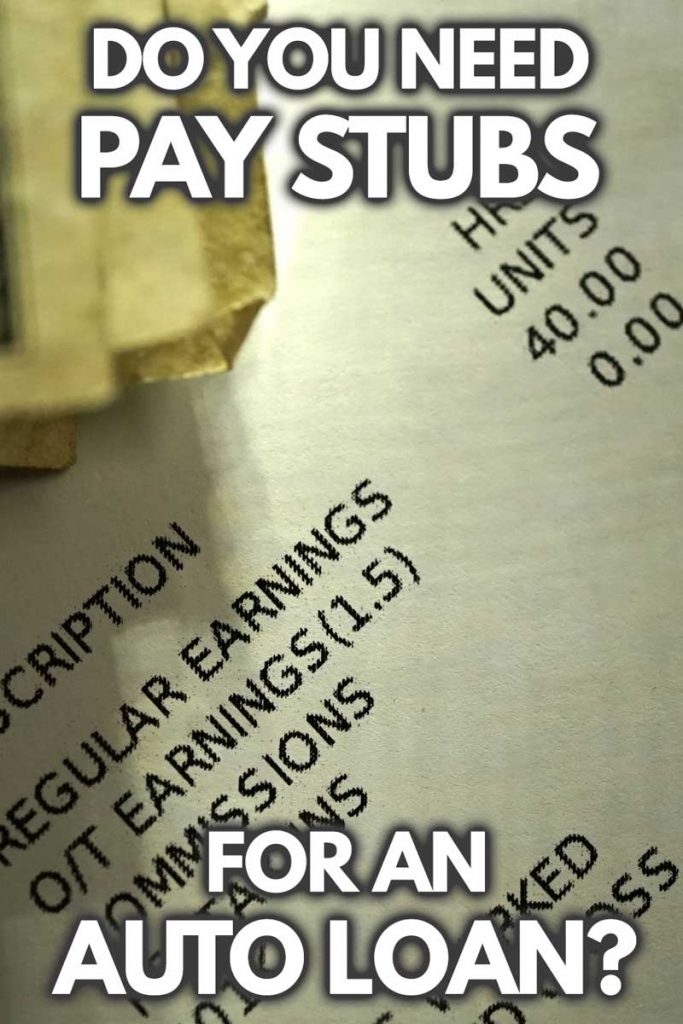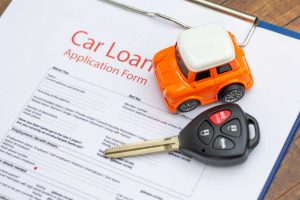Knowing whether you need pay stubs for an auto loan can help you determine if a new car could be in your future. Auto loans can be complicated, and there are often many steps involved in the approval process. We’ve done the necessary research so you can feel prepared when you step onto the sales lot.
The short answer is that no, you don’t usually need pay stubs for an auto loan. If you have another means of proving your income, that’s good news. In that case, auto lenders don’t need your latest paycheck to verify your ability to repay what you owe.
Additional financial documentation can help prove your monthly income, such as:
- A signed statement from your employer, confirming your wages
- Last year’s tax return
- State or federal forms showing disability or social security payments
Gather these documents, and you may be able to bypass the paystub requirement when buying a car.

It’s complicated, we know. Fortunately, we can walk you through the different types of documentation you need to make car buying a less stressful experience. Read on for details.
Why Do You Need Pay Stubs For An Auto Loan?
When you apply for a loan for a car, truck, SUV, or van, you’re not asking the dealership or sales lot for a loan. Instead, you’re appealing to automotive lenders—typically banks—who lend you the money to close the sale.
Lenders look at your creditworthiness, which involves pulling a credit score from your records. Credit scores range from 300 to 850, with a score of 800 to 850 ranking as “exceptional.” Not to worry, though—most applicants with a score of 670 (“good”) or above can get an affordable auto loan rate.
Creditworthiness
This means you repay your debts, so it’s a vital consideration for lenders. In addition to your track record of repaying debt, however, lenders also want to see that you have enough money coming in to manage your monthly responsibilities.
Pay stubs can verify that you make enough money each month to cover all your needs. With an accurate estimate of your income, banks and loan companies calculate your debt-to-income ratio.
Debt-to-income ratio
This involves adding up your monthly debt and dividing it by your gross monthly income. In Essence, lenders want you to keep this ratio below 43 percent to ensure you don’t overextend your cash flow.
To summarize: lenders use your credit score and monthly income to decide whether you’re trustworthy—and financially stable—enough to pay them back. Pay stubs are a straightforward way to prove your monthly income, and most folks have them readily available. But if you don’t receive traditional pay stubs, don’t worry—there are other alternatives.
How Do Auto Lenders Verify Employment?
Auto lenders typically verify employment by checking your pay stubs. If you visit a car dealership today and have your most recent pay stubs from this month and last, that’s proof enough that you have gainful employment.
If you can’t produce pay stubs for whatever reason, lenders still need to confirm that you have a job that pays enough to cover your responsibilities. One way to achieve this proof is by having your employer write a letter. The letter certifies that they pay you X amount for X hours of work each month. Many landlords and financial institutions will accept such a letter as proof of income.
Even without a written verification from your boss, a lender may be able to confirm your employment verbally. Using the information you provide, a lender can call and ask basic questions to establish where you work and how often. Providing data such as your supervisor’s name, the business location, and contact details make the process simpler. Banks and lenders can also verify employment by confirming that your pay stubs (or declared income) match regular deposits to your bank account. More on that below.
How Do Banks Verify Pay Stubs?

Anyone can attempt to fake a pay stub to get a loan or cheat a business out of money. So, how do organizations and financial institutions verify your pay stubs? First, they check your bank account. Verifying what amounts go in—and whether they match your stubs—is a fundamental way that lenders confirm how much cash you have coming in.
Agents can also call your employer or do their research on the company you claim to work for. They may request transcripts from the IRS to confirm that your self-supplied tax information is accurate. The IRS offers an income verification express service for lenders to verify borrowers’ details. In signing your loan application paperwork, you likely consent to the lenders’ use of this service for verification.
Either way, lying or forging pay stubs is not a good idea. There are multiple avenues of verification, and any of them can result in rejection of your loan application. Falsifying documents can also mar your credit or result in legal action—something you don’t want on your record.
Can I Get A Car Loan With No Job And A Co-Signer?
If you have no job and no other source of income, obtaining a vehicle loan can be complicated. Plus, if your credit is poor and you lack gainful employment, most lenders won’t want to help. For many loan applicants, a combination of decent income and a robust credit score are minimum requirements for getting a new or used car.
Even without employment, if you have income like social security, disability, alimony, or child support benefits, you may qualify for a car loan with a co-signer. Because only income from employment is garnishable—able to be collected to pay debt—lenders want to see these figures.
Most lenders are not interested in income that they can’t take if you refuse to or are unable to pay. Therefore, if you have some money coming in—but not a regular job—and find a co-signer with decent garnishable wages and credit, you’re in luck. That combination of creditworthiness and income can help close the loan.
Can A Co-Signer Help Me Get A Loan With Bad Credit?
Poor credit is a common reason for loan application rejections. The good news is, if you have verifiable income that meets lender requirements, having a co-signer can get you the car you want at a reasonable price.
Having a co-signer means that if you refuse to or cannot pay the loan back, the co-signer takes responsibility. The person who co-signs for you needs to be prepared to take over the financial aspect of the loan if you are unable to. However, it’s important to note that lack of payment can affect both of your credit scores. You need to be on the same page before entering the loan agreement.
How Do I Prove Income If I’m Self-Employed?

If you work for yourself, it can be challenging to provide the documentation lenders need to issue you a loan. However, it’s not impossible.
As a business owner, you must file taxes each year. Many lenders will accept a tax return—or multiple years of returns—to verify your income and employment. Further, some lenders also request a profit and loss statement. Depending on the nature of your business, your profits and losses may vary throughout the year. This statement can help highlight where and how your income comes in, and whether it’s reliable.
In some cases, lenders may want two years’ worth of tax returns to calculate your average income. However, this is more common with home loan applications rather than automotive ones.
Is It Illegal To Lie On A Loan Application?
Let’s say your last few months’ income isn’t ideal, and you typically earn more. But at the same time, you need to purchase a new car now. Is it ok to fudge the numbers or fake pay stubs to get a loan ASAP?
Experts confirm that it is illegal to lie on a loan application, whether it’s for a car, a home, or a personal loan or advance.
In short, it’s a terrible idea—and it could result in you going to jail or owing even more than the loan you receive. Of course, that’s if you even get past the approval process in the first place. Fortunately, there are many legitimate ways to get a loan, even if your credit is subpar or your income is below lender thresholds.
Pay stubs aren’t a requirement for most automotive transactions. While you may not need pay stubs in hand to qualify for an auto loan, you still need paperwork to complete the process—and get the best deal. Do your best, to be honest with your information and give the lender every document they request to expedite the transaction. You might drive home in a new (or used) car—favorable loan terms in hand.



